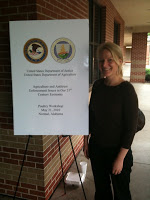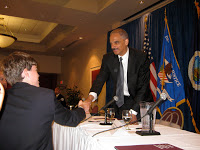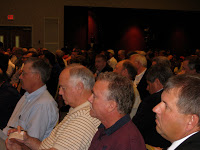
 Last week I headed south to Huntsville, Alabama, for the first ever workshop to examine issues of competition in the poultry sector. The meeting was the second in an unprecedented series of five workshops being hosted by the U.S. Department of Agriculture (USDA) and the Department of Justice (DOJ) to investigate corporate concentration and anti-trust enforcement in agriculture.
Last week I headed south to Huntsville, Alabama, for the first ever workshop to examine issues of competition in the poultry sector. The meeting was the second in an unprecedented series of five workshops being hosted by the U.S. Department of Agriculture (USDA) and the Department of Justice (DOJ) to investigate corporate concentration and anti-trust enforcement in agriculture.
 The day was opened with remarks by a star-studded lineup: Secretary of Agriculture Tom Vilsack, Attorney General Eric Holder, Assistant Attorney General for Antitrust Christine Varney, and a slew of local politicians. Vilsack set the tone by asking, “What needs to be done to ensure a fair, competitive market? How do we bring greater coordination and communication between DOJ and USDA for poultry enforcement?”
The day was opened with remarks by a star-studded lineup: Secretary of Agriculture Tom Vilsack, Attorney General Eric Holder, Assistant Attorney General for Antitrust Christine Varney, and a slew of local politicians. Vilsack set the tone by asking, “What needs to be done to ensure a fair, competitive market? How do we bring greater coordination and communication between DOJ and USDA for poultry enforcement?”
It was a heartbreaking trip, in many ways. The recurring theme: hardworking family farmers are trapped in a one-sided contract system leaving them in major debt and out of options.
In his opening remarks, Alabama Congressman Artur Davis reflected upon meeting a poultry grower who discouraged his son from poultry production because he had so little confidence in the viability of the profession. Davis acknowledged the anti-competitive conditions that hinder the sector and went on to plea, “We can’t walk away from our farmers. There is something fundamentally flawed when a father has to say to his son – don’t walk the path I walked.”
 The turnout was low compared to the inaugural USDA/DOJ Iowa hearing held in March. I ate lunch in the overflow room with not a soul in sight. But this didn’t come as much of a surprise. Key grievances being examined were the intimidation tactics used by poultry processors to keep contract growers in a state of near servitude. In the 48 hours I spent in Huntsville, I heard dozens of stories of growers who in just the past week had been bullied by service techs and other processor reps into not showing up to the hearing. One farmer who I spent much of the prior night with going over his comments, found me on Friday to say he wasn’t up to it. He spotted an industry lawyer in the room, and that was enough to keep him quiet.
The turnout was low compared to the inaugural USDA/DOJ Iowa hearing held in March. I ate lunch in the overflow room with not a soul in sight. But this didn’t come as much of a surprise. Key grievances being examined were the intimidation tactics used by poultry processors to keep contract growers in a state of near servitude. In the 48 hours I spent in Huntsville, I heard dozens of stories of growers who in just the past week had been bullied by service techs and other processor reps into not showing up to the hearing. One farmer who I spent much of the prior night with going over his comments, found me on Friday to say he wasn’t up to it. He spotted an industry lawyer in the room, and that was enough to keep him quiet.
One of the more poignant testimonies came during the morning’s farmer panel from an active Alabama grower. He talked passionately about his service to America as a veteran and his belief in our country – a belief so strong that he felt compelled to speak out against the patently un-American abuses that typify poultry contracts, despite facing the very real threat of retaliation by his processor for doing so. Few dry eyes were left in the crowd.
Varney, who joined the grower at the table, made a public point of handing him her direct number to be used in the case of retaliation. The gesture inspired a riotous applause, but unfortunately I don’t think it offered enough confidence for many nervous onlookers to take the stand.
Yet, even within an atmosphere permeated by fear, the dire message of the poultry growers resounded: the false promises of security, the inequitable and abusive treatment, the outrageous debt, the lack of transparency, the extreme imbalance of power, the severe lack of competition, the failed enforcement of anti-trust law, the ugly reality of poultry production in this country.
The current system of contract poultry production is not just unfair, it’s wrong. Thanks to all of you who took action last week to encourage DOJ and USDA to rein in these companies so that growers are treated with the fairness and dignity they deserve. If you haven’t taken action yet, there’s still time: click here for more information.
Read the public comment I made on behalf of Farm Aid by clicking here (PDF format).

